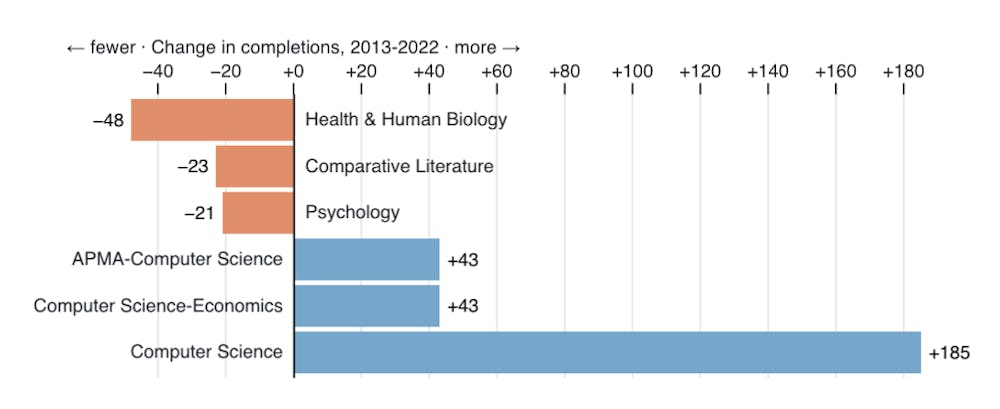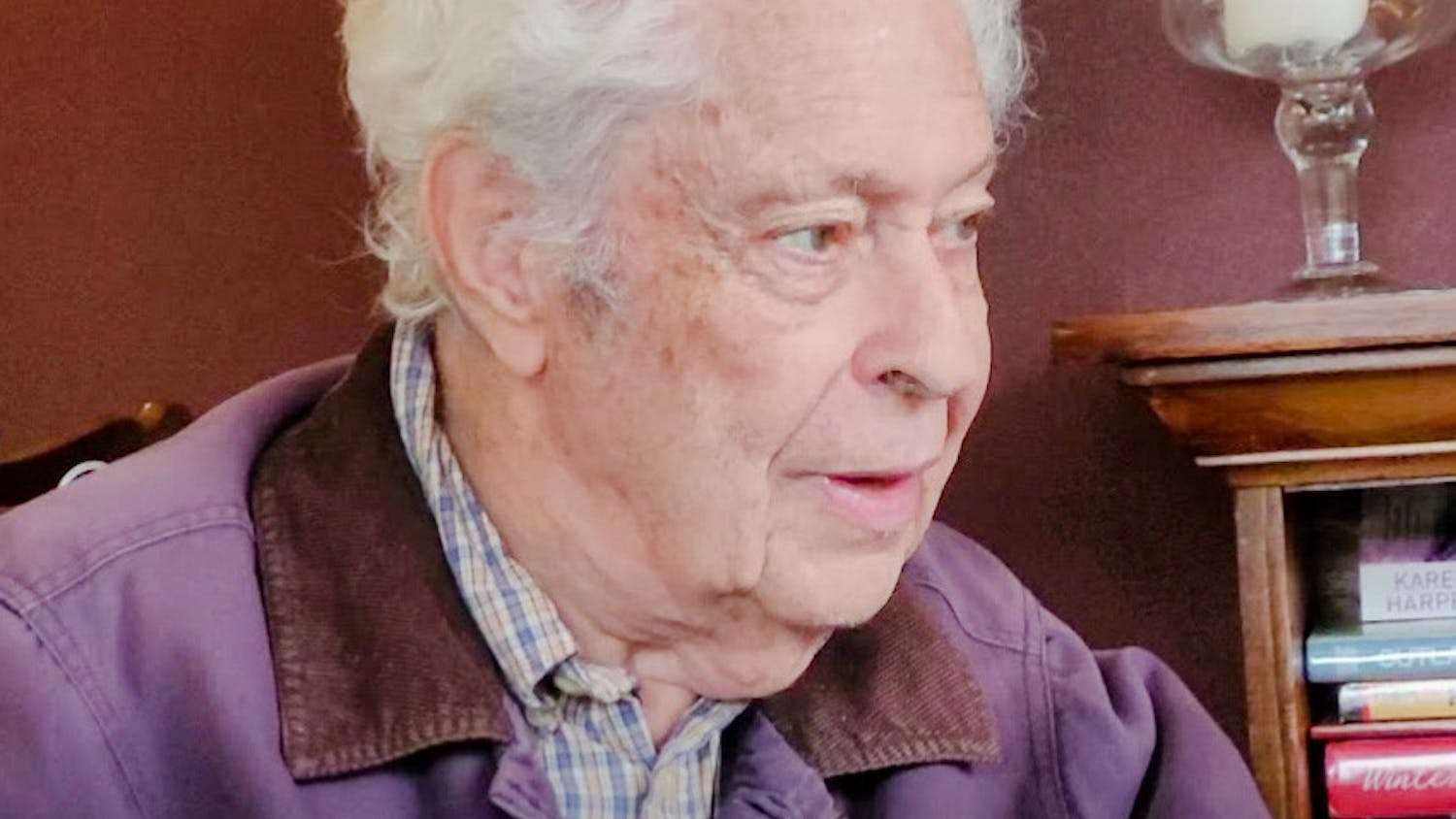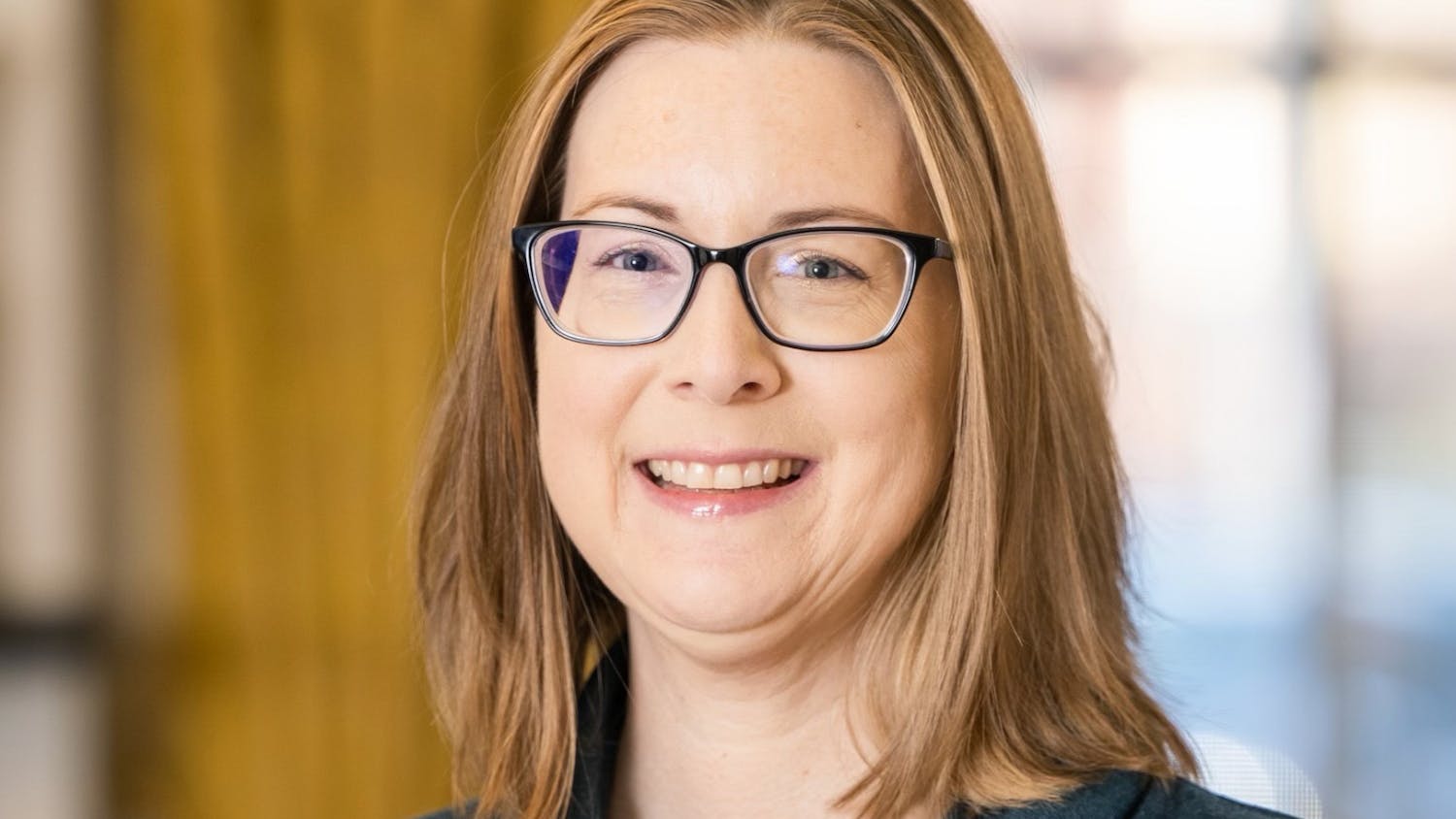For over 50 years, the University’s Open Curriculum has allowed students to pursue a variety of academic interests before narrowing in on a field they are ultimately most passionate about.
But over the past 10 years, the University has seen a dramatic increase in the number of students concentrating in areas of study most transferable to the workforce.
Since 2013, students have increasingly shifted to what many students described as more career-oriented areas of study — such as computer science, economics and applied mathematics. At the same time, some of the more classically liberal arts concentrations, such as comparative literature or archeology, have seen dwindling numbers of concentrators, according to data from the Office of Institutional Research dating back to 2013.
Students have increasingly flocked toward concentrations that directly translate into a job post graduation at universities and colleges all over the country, even at liberal arts schools like Brown. The Herald spoke with several students and faculty about these concentration trends and the factors that could be influencing the size of each concentration.
Pre-professionalism at Brown
According to CareerLAB Director Matthew Donato, shifts in concentration data from 2013 to 2022 can be attributed to the rise of pre-professionalism at the University.
“Students often approach the process of thinking about careers assuming that there should be a direct connection between concentration decisions and career path or pre-professional planning,” Donato said. “In our career counseling and peer career advising appointments, we share with students that there doesn't have to be a direct connection between concentration and career.”
Donato explained that students often select their concentration based on its relationship to their intended career path, though “many students also pursue careers that are only somewhat or not-at-all related to their area of study.”
“Career planning is a highly individualized activity and we advise students that their chosen concentration will support virtually any career path they choose to pursue,” he said. “Our post-graduate data also bears this out — while some concentrations are more tightly linked to some career paths, like Econ to financial services careers for example, the reality is that students from every concentration are successful in pursuing jobs in a wide variety of fields.”
And after graduation, “many humanities concentrators also pursue careers in finance or consulting,” Donato added.
Jerry Lu ’25, a computer science and business economics concentrator, applied to Brown to study modern culture and media. He applied under the concentration because he found it “most interesting and perfectly fit for” his interests.
“But when freshman year came around, thinking about career prospects, I decided not to take any MCM classes at all,” he said. “As an international student, I think that job security is the most important thing because I’m here on limited time and it’s a priority for me to land a stable job that can pay me properly.”
Although Lu came into college “having never touched code in my life,” he pinpointed computer science and business economics as the perfect crossroads between two different concentrations with promising track records for job security.
“Keeping in mind the plentiful career opportunities — most of which are high-paying — associated with the computer science discipline, I decided to give it a shot,” Lu said. “I also decided on business econ because of the career opportunities associated with it as well.”
“Given that I’m not set on which discipline I want to focus on, I want to keep my options open and cast a wide net,” he added.
Computing and information technology careers have remained one of the most common careers of University graduates. Since 2015, the industry has been the second-largest employer of Brown alums that are five years out from graduation, according to the OIR.
“It’s also quite scary how much AI can do for conventional coding jobs,” Lu added. “I take comfort in knowing that I have some technical knowledge about the biggest players in tech these days, but am definitely curious about how this will affect job security among conventional (computer science) roles.”
Passion and practicality
For Michael Yeh ’23, concentrating in Applied Math-Economics was a “practical” decision that let him pursue his academic interests.
“I definitely wanted … a concentration that is a little bit more professional,” Yeh said. “I wanted to keep sharpening my analytical skills in order to apply for jobs,” he said.
At the same time, Yeh said he enjoyed the mix of quantitative and qualitative methods that his concentration allowed him to practice.
Akshay Mehta ’26 is concentrating in earth, environmental and planetary sciences at the University. Since 2013, the number of EEPS concentrators has remained relatively steady. Although there have not been statistically significant changes in the number of students concentrating in EEPS, the field remains one of the smallest populated fields of study at the University.
For Mehta, choosing to focus on an EEPS degree was an easy choice — one made out of passion.
“I’m concentrating in EEPS with the intention of doing research in the field of meteorology, specifically,” he said. “My interest in (the field) comes both from a place of childhood passion, as well as desire to advocate for green solutions to atmospheric damaging problems.”
Donato told The Herald that one of the key elements of professional success the CareerLAB hopes to instill in students is the prioritization of “transferable skills” — skills used across unrelated fields that can bridge the gap between passion and practicality.
“While you’re here, we want you to explore pathways that will help you develop a skill,” he said. “Maybe it aligns with something that you're studying in your concentration, or just something that you personally find rewarding or interesting.”
“For students who feel like they shouldn’t apply for a job in an industry because they concentrated in something completely different than what that job does, we always talk with these students about transferable skills,” Donato said. “All of the things that you’ve done are going to help you develop skills and be part of the story that you tell about your candidacy for anything.”

Neil Mehta is the editor-in-chief and president of the Brown Daily Herald's 134th editorial board. They study public health and statistics at Brown. Outside the office, you can find Neil baking and playing Tetris.

Sofia Barnett is a University News editor overseeing the faculty and higher education beat. She is a junior from Texas studying history and English nonfiction and enjoys freelancing in her free time.





